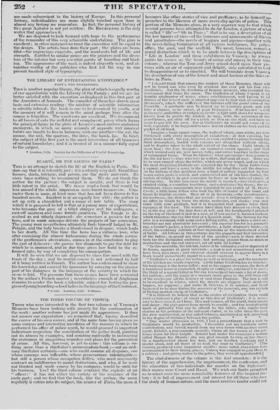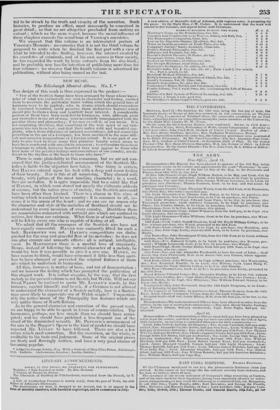THE THIRD VOLUME OF VIDOCQ.
THOSE who were interested in the first two volumes of VIDOCQ'S Memoirs have been looking with anxiety for the continuation of the work : another volume has just made its appearance. It does not answer our expectation : we conceived that, having described the course of his own career, and at the same time having given us some curious and interesting anecdotes of the manner in which he performed his office of police agent, he would proceed to important indications respecting the constitution of the police itself, pointing out its abuses by examples, and assisting materially in instructing the statesman in suggesting remedies and plans for the prevention of crime. All this, however, is yet to come : this volume is no- thing more than a thieftaker's memorandum-hook ;—not an ordi- nary thieflaker certainly—one who could assume all disguises, one whose courage was inflexible, whose perseverance indefatigable— but still a person whose occupation defiles, who must necessarily contract an indifference to moral distinctions, and who, if he were not blunted and made coarse by his company, would be unfit for his business. Yes ! the third volume contains the exploits of an " officer:" it has not either the variety or the romance of the early part; and we find that the book, like the author, the more regularly it enters into its subject, the crimes of Paris, the more it becomes like other stories of vice and profligacy, as he himself ap_ proaches to the likeness of more every-day agents of police. This portion of the Memoirs gives, in a very superior way to that which several persons have attempted to do for London, a picture of what is called " life"—" life in Paris ;" that is to say, a description of all the low haunts of vice—of the humours and amusements of thieves and prostitutes—the revels of beggars and gipsies—together with the never-failing termination of all vicious indulgence, the police- office, the gaol, and the scaffold. We must, however, remark a grand distinction which is to be made between 1-4,e descriptions of " Life in London" and these exhibitions by VIDOCQ : he always paints his scenes as the haunts of crime and misery in their true colours ; whereas the Tom and Jerry school dwell upon their pic- tures with an air of enjoyment and delight, only calculated to lead to disappointment or to mischief. We will translate from Yu:loco his description of one of the lowest and most lawless of the thieves- holes in Paris.
" I should think that among the readers of these Memoirs, there will not be found one who even by accident has over put his foot into Guillotin's. Not the Dr. Guillotin of famous memory, who invented the instrument that bears his name. The Guillotin of whom I speak is art humble adulterator of wines, whose establishment, well known to all thieves of the lowest rank, is situated opposite to that sink of corruption Desnoyer's, which the rulers of the barriers call the eerenril salon of the Courtille. A mechanic may lie honest up to a certain point, and still take a chance, as he passes, at papa Desnoyer's. If he has not 'a cold in his eves', and either at cudgels or .-yarefte (a fight with shoes for weapons) knows how to puzzle the wicked, he may, with the assistance of the gensd'armes, get clear off for a crack or two on the skull, and have no score to pay brit his own. But at Guillotin's he would not come off so well, especially if he happened to have decent clothes on his back and his pocket at all lined.
" Imagine a large square room, the walls of which, once white, are now blackened with every description of exhalation : at first entering, the place looks small ; the eye, however, is soon enabled to pierce through the thick atmosphere, loaded with vapours not altogether without odour, and by degrees takes in the whole extent of the chaos. Light breaks in upon him ; the fogs dissipate; an animatc.d crowd appears ; and that which seemed only air, now moves, talks, and mixes together in the shape of substantial forms. Melt beetitudes ! what epicureans ! how j,)yous is the life led here !—they who love to wallow, find mud all over. Many arc to be seen ranged along the tables, which are never wiped, and on which the most disgusting libations arc renewed day by day : these tables form a square, and leave a space in the middle for what they call the dancers. At the bottom of this pestilent cave, a kind of gallery supported by four worm-eaten posts is raised, and constructed out of old boat-timber, the variety of which is in part concealed by three or four tattered pieces of out tapestry. In this hen-coop the music is roosted,—two clarioncts, a cracked violin, a sounding trombone, and a deafening big drum ; five in- struments whose movements were regulated by tile crutch of M. Double Croehe, a little lame fellow who took thetitle of leader of the band, and timed its terrible accords. Here all is in harmony,—the countenances, the costumes, the dishes that are served : dres.s is indispensable: there is no office in which to leave the sticks, umbrellas, and cloaks : you may enter with your picklock, but it is requested that parties leave their equipage at the door. The women have their hair dressed en chien, that is, in the dog style : the hair flows at will, and the handkerchief perched on the top of the head is tied in a rose, Spanish if you prefer it, forms a cockade which threatens the eye like that of a Si;anish mule. The fashion for the men is a waistcoat with a cap and a' alling collar, if you have a shirt on : breeches are not absolutely necessary ;•the supreroze bon ton is a gunner's cap, a hussar's jacket, a lancer's pantaloons, a light dragoon's boots,—in short, the caitaway rubbish of four regiments or the wardrobe of a field of battle. All fellows in this costume are the puppets and first favourites of the ladies; so proud are they of the cavalry—such is their decided taste for the disbanded uniforms: but nothing pleases them so much as mustachios and the red eharivari, set off with its leather.
" In this assembly, the felt hat, unless it be without a roof or deprived of its brims, appears at great intervals : a coat is not remembered ever to have been seen there ; and whoever should venture to appear there in a frock would undoubtedly depart in a short waistcoat.
" Guillotin's is a place for eating as well as drinking, and the mysteries of the kitchen are worth exposing. Little father Guillotin has no butcher: his tradesman is the horse-killer ; and in his copper stewpans, the flesh of a foundered horse is converted, in spite of verdigrise, into bceuf it la mode; the thigh of a spaniel killed in the rue Gurinegaud becomes a leg of down- fed mutton ; and the magic of a savoury sauce gives to the still-born calf of the cowkeeper all the 'delicacy of veal from Pontoise. The fare is said to be excellent in winter, when the streets are slippery (and accidents happen, we suppose) ; and under M. Delevau, if in summer, and bread happened to be dear durinm° the massacre of the innocents, one was certain of finding mutton cheap at Guillotin's.
"It is difficult to believe that in the centre of civilization there could exist so hideous a place of resort as this den of Guillotin's : it is neces- sary to have seen it, as I have. Men and women, all the world, there smoke and dance : the pipe passes from mouth to mouth - and the most pleasing mark of gallantry that can be offered to the ladies, who expose their charms in the postures of the indecent ehahut, is to offer them the quid, the chew sentimental, or else rolled tobacco, masticated or not, according to tire degree of intimacy between the parties.
" One winter afternoon in 1811, I had a presentiment that a visit to Guillotin's would be productive. I therefore put my wardrobe under contribution, and betook myself from my own house with another secret agent, Ribolet, a consummate assouille, whom all the houris of the pot- house claim for their knight. Ribolet had under his command a woman called Manors the Blonde : she was glad enough to strip off her finery, tie a handkerchief about her hair, put on woollen stockings and a scarlet cloak, and all three of us took the road to Guillotin's." [The evening produced some important results : some noted characters were accompanied to their hiding-places; Vidocq was engaged to join them in a robbery ; and giving notice to the police, they were all apprehended.] The chef-d'reuvre of the volume is the last anecdote: it is the history of the apprehension, the imprisonment, the confession, and the execution of two individuals for murder on the high-read : their names were Court and Raoul. We wish our limits permitted us to select even the more remarkable features of this tragical his- tory: it is full of improvement and interest for all those who love the study of human nature, and the most careless reader could not
fail to be struck by the truth and vivacity of the narration. Such histories, to produce an effect, must necessarily be conceived in great detail ; so that we are altogether precluded from making an extract ; which we the more regret, because the moral influence of these chapters exceeds the usual tone of VIDOCQ'S anecdotes We suspect that this volume is an intercalated portion of ViDoccis Memoirs : we conceive that it is not the third volume he proposed to write when he finished the first part with a view of what he intended to do : finding, however, the interest created by his anecdotes of criminals, and of his own scenes in their society, he has expanded the work by large extracts from his day-book ; and he probably now has the intention of publishing more than his four volumes : we observe that the fourth volume is advertised for publication, without also being named as the last.



















 Previous page
Previous page